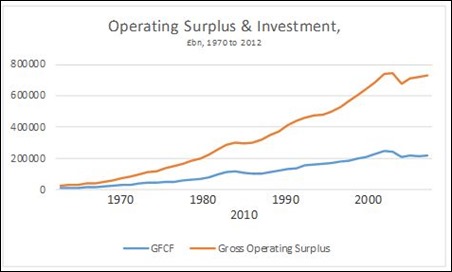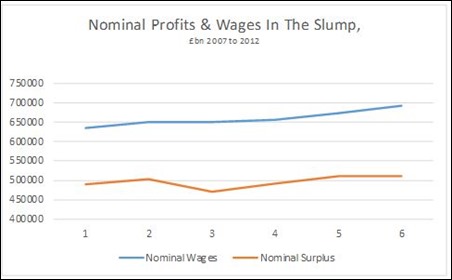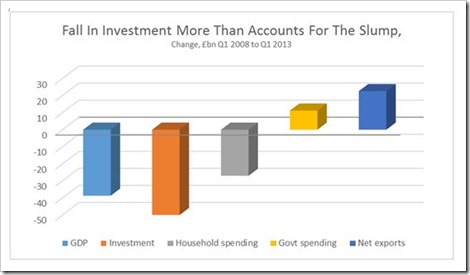Why do we have ‘austerity’ and what is the alternative?
 The national launch of the People’s Assembly against Austerity is a very welcome development, says economist Michael Burke. It brings together a number of the largest unions, anti-cuts group and political forces both inside and outside the Labour Party in opposition to austerity policies.
The national launch of the People’s Assembly against Austerity is a very welcome development, says economist Michael Burke. It brings together a number of the largest unions, anti-cuts group and political forces both inside and outside the Labour Party in opposition to austerity policies.
One of the first acts of the Coalition government was a simultaneous increase in VAT and a cut in the level of corporation tax. According to the Treasury these amounted to approximately the same (£12bn to £13bn) in terms of revenue. But the VAT hike was disproportionately paid for by the poor and middle income earners, who spend more of their incomes on VAT-able goods. The corporation tax cut was an increase in the net income for firms. Taken together they amount to a transfer of incomes from workers and the poor to capital and the rich, the owners of firms.
This transfer of incomes from labour and the poor to capital and the rich is the essence of austerity policies. It is workers and the poor who are being made to pay for the crisis.
The purpose of austerity
In an economic downturn, profits fall at a greater rate than the fall in output. This is because profits are the surplus of firms after they have paid costs, including fixed costs, and the costs of labour and materials. As the revenue from sales falls but costs are static or do not fall so far then profits are hit. Therefore a key mechanism for restoring profits is to reduce costs, most especially the costs of labour.
This is what happened in the current slump, as shown in Fig.1 below. In nominal terms, before taking account of inflation, between 2008 and 2009 GDP contracted by £39bn and the operating surplus of firms fell by £33bn. Of course, in real terms the fall was more severe in both cases. But the natural outcome is that profits will bear the brunt of the fall in output.
The aim of austerity is to interrupt, divert and reverse this process by cutting wages so that profits can be restored. Cuts to public sector pay have a ‘demonstration effect’, designed to lower the ceiling for pay in the private sector. Cuts to social protection entitlements are meant to force all workers to accept lower pay. These policies are supplemented by privatisations which reintroduce the accumulation of profits into areas of the economy formerly run by the state (NHS, rail, Royal Mail, and so on) and corporate taxes are cut to boost net profits.
This has had an effect. The austerity policy introduced in 2010 has led to a £40bn increase in firms’ operating surplus from their low-point in 2009. But this is not yet a thorough-going reversal. Nominal wages have risen by £43bn over the same period. It should be stressed that these data do not take account of inflation, so that there has been a real fall in living standards but equally only a very limited rise in profits.
Austerity policies have reversed the decline in profits and reduced the wage share of national income. But they have not yet allowed profits to rise so far that firms are once more investing and expecting profits.
The alternative to austerity
The cause of the economic slump remains the slump in investment. In Britain the fall in investment (gross fixed capital formation) more than accounts for the entire fall in GDP. In real terms between the 1stquarter of 2008 and the 1st quarter of 2013 GDP fell by £38.7bn while the fall in GFCF is now £50bn (as other components of growth have risen such as government spending and net exports). This is shown in Fig. 2 below.
This is now a combination of the private sector’s refusal to invest alongside government cutting its own investment. It is not possible to have a sustained improvement in economic activity without an increase in investment.
The long-term relative decline of the British economy is driven by the declining rate of investment. In 1970 the ratio of investment to profits was 70%, that is the total level of investment in the economy was equivalent to 70% of firms’ operating surplus. In 2012 this investment ratio had fallen to 42%. As a result, investment has fallen from 19.4% of GDP to just 14.1%.
The declining rate of investment has been a long process. But even as late as 2007 the investment rate was 51% and the rate of investment as a proportion of GDP was 17.7%. As a result of the crisis quantitative change has become a qualitative one.

As the private sector’s refusal to invest is because they cannot be certain of making a profit it falls to the state to invest on its own account. It can make successful large-scale investments which are not profitable to the private sector because uniquely it derives its return from taxation. Any general increase in economic activity will see tax revenues rise and social protection payments automatically fall.
The vast level of uninvested profits is now sitting idle in state-owned banks which failed because they made unprofitable investments. It is simply a matter of political will to tap these vast resources for investment in housing, energy, transport, infrastructure and education. This would lead to economic revival.
The reason it is so fiercely resisted is because it runs counter to the whole thrust of austerity, which is to restore profits. But increasing state-led investment is the only feasible road out of the crisis which does not lead to the further immiseration of the overwhelming majority of the population.
7 comments
7 responses to “Why do we have ‘austerity’ and what is the alternative?”
Left Unity is active in movements and campaigns across the left, working to create an alternative to the main political parties.
About Left Unity
Read our manifesto
Left Unity is a member of the European Left Party. 
Read the European Left Manifesto
ACTIVIST CALENDAR
Events and protests from around the movement, and local Left Unity meetings.

Saturday 10th January: No to Trump’s war on Venezuela
Protest outside Downing Street from 1 to 3pm.
More events »
GET UPDATES
Sign up to the Left Unity email newsletter.
CAMPAIGNING MATERIALS
Get the latest Left Unity resources.





Good stuff! I have always argued the Tories and the Right/Neo Liberals everywhere have one policy CHEAP LABOUR. Some argue that capitalism is running out of markets in the West and has to penetrate the public sector whilst it expands into the South East and Less Developed World so perhaps we could help labour internationally by supporting A Global Minimum Wage, A Global Shorter Working Week, Global Better Health & Safety and Global Earlier Retriement to free “Time Poor’ humanity so we can all enjoy life and our planet. We could also in the West have windfall taxes on big business, close tax havens and offshore banking and I think the rich trousered £850b in the UK in 2010, we could have a Land Tax and a Wealth Tax (the 1,000 richest people in the UK have £450b between hem), could collect the unpaid taxes by the wealthy (£70b a year), we could take rail, some banks and the utilities into public ownership to be run democratically with staff electing the boards and communities having a say, we could have a Real Financial Transaction Tax 1% would bring in £350b throughout Europe – 5% £1.75tr. Could end bankers bonuses, reduce VAT, have free public transport run by local authorities. It is the labour of the working billions which creates the wealth and makes societies work and THE REAL DEPENDENCY CULTURE is that of the RICH & POWERFUL – they are totally dependent on us and as John Lennon sang in Power to the People, “You better give them what they really own!”
We also need to win the propaganda war over welfare as the Right and right wing media set working people against their neighbours re benefits and against new immigrants TO DISTRACT THEM FROM THE RICH & POWERFUL as millionaires are usually distant from theirr lives and made invisible. But as well as our w class welfare state there is A MASSIVE MIDDLE CLASS WELFARE STATE – they are subsidised on practically everything tax relief private health, private education, public schools with charitable status, tax loopholes et etc . We shoud take them on and use their language against them!
Finally an appeal, after attending a lecture by Ha Joon Chang last year I have read the financial pages of the newspapers ever since as he suggested and you see the rich in their parallel universe – as some people on low incomes are having to find £15-25 a week for the Bedroom Tax I read that Barclays had just given 412 senior executives a £1m bonus each! – it’s time to win the propaganda campaign!
There is hope, yours in solidarity!
Well said Bazza !
Really good article! I understand it! I think these arguments are central because currently it is a battle against austerity! Therefore I don’t think we can pretend that this word doesn’t exist or find a substitute, as was suggested elsewhere in Left Unity. We need to take these economic arguments and make them ours. We need resilient clear facts that stand the test of argument. The more difficult concepts need translating e.g most people switch off when you start talking about the ‘rate of profit’ Also we cannot rely on the usual slogans e.g. ‘Smash the Rich’ cos to most people this says nothing new!
I’d like to throw a spanner in the works….Mike describes a “transfer of incomes from workers and the poor to capital and the rich, the owners of firms”. This conclusion supposes that firms are owned by “the rich”…..the trouble is that this is not a very good analysis of the ownership of firms. Most of UK plc is actually owned by…guess who….the workers. Hows that you will ask…..it is because the biggest shareholders of UK plc are the pension funds that many of us have our money in. Ownership is actually substantially socialised. The problem is that this ownership is divorced from control…this separation allows corporate executives to capture a disproportionate share if the economic surplus. The separation is facilitated by a long agency chain between the real owners and the firms they own….this agency chain includes an array of financial institutions such as asset management firms and this array of financial agents also use their functions to capture another slice the economic surplus. Meanwhile workers and the pension fund trustees who are supposed to be looking after their financial interests sit by haplessly watching it all going on and they do so because they believe the bullshit which they are fed by the very financial agents they employ to invest on their behalf. The left needs to wake up to the huge challenge that exists to grapple with the challenge of exerting democratic control of pension fund investment. I was a pension trustee for 6 years and am hoping to back into it again soon….I can tell you there is a big challenge here and socialists need to wake up to it.
Good subtle corrective point, Jim.
However, the real money goes to the corporate executives, as you say, and the inequality caused by this over the last twenty years in particular is a disgrace. A left government would establish democratic control of pension funds by those insured and strict limits of syphoning off of profits and charges.
Also there is still a huge inherited ownership of shares and a class of people who live off dividends, however much the establishment try to claim that the rich are all entrepreneurs who rose to riches from hard times.
I like this too because it is written in such a way that you don’t have to be an economist to understand it: a rare thing!
On the other hand (and this is NOT a criticism of this article – it’s more like a plea to anyone with the know-how) there is a crying need for a new kind of economics that is not driven by capitalism and profit….and that is also written in a way that most of us can understand! For example, I understand that under Sharia economics, when you lend, you don’t require interest on the loan. I desperately want to hear more and different ideas as we have to have a viable alternative to aim for (however long term).
The watch word at the moment is “growth” but we need to ensure its both sustainable & ethical example being a national programme of home insulation ,which will create jobs locally up & down the UK ,deliver people warm homes ,thus cutting their fuel bills & drive down fuel poverty & improve the carbon footprint in each respective locality & save those on low pay/benefits money .
Encourage workers/community co-ops to set up ,give tax breaks where they employ & use local companies ,encourage councils to set up forums in council offices advising co-ops on services the respective co-op could tender for ,that way you ensure local employment get true localism & allow a co-op to run alongside the public sector ,but not be their to replace it unless those working within a respective department wished to as an alternative to privatisation .
Just two alternative ways of growth & employment that the establishment parties dont tap into enough,if at all .
Peter………………